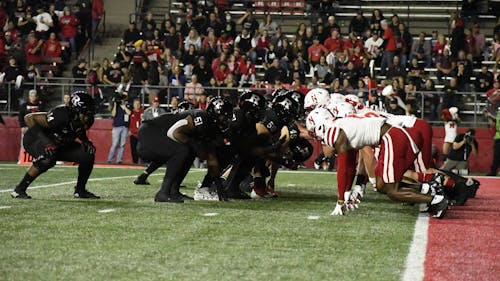DONNELLY-FINE: Name, image, likeness deals — dream deferred or denied?
Column: Existential Red

Student-athletes, especially those in the Big Ten Conference and other Division I programs, work demanding schedules, spend hours practicing and watching film with coaches and dedicate further time to their schoolwork. For this, they deserve not only our esteem and support on the field but also broader recognition for the financial boon that athletics provides Rutgers.
While the Athletics Department has come under fire in this paper and elsewhere for indiscretions by coaching staff and profligate spending (for which Director of Intercollegiate Athletics Pat Hobbs should probably lose his job), the athletes wearing scarlet and white do their best each day and have had noted success in recent years.
This year has brought a revolution to college sports in the form of “name, image and likeness” (NIL) deals, representing the first time student-athletes can sign endorsement deals and profit off the national attention some players and teams garner. Athletes have long voiced displeasure with the restrictions placed on them by the NCAA.
Famously, the University of Connecticut's men’s basketball star Shabazz Napier told reporters in 2014, fresh off the national championship game at the culmination of March Madness that despite his full scholarship, there were “nights where he's 'starving' because he doesn't have money to buy food.” For decades, student-athletes were barred from any monetary compensation beyond their athletic scholarships despite serious financial burdens.
NIL has changed that for some of the most high-profile college athletes like Alabama’s Heisman Trophy-winning quarterback Bryce Young, who has signed deals worth millions of dollars. Even athletes at lower-profile schools, playing sports that do not bring in the kind of TV deals that schools covet, are making extra spending money coaching sports camps for local kids.
Rutgers athletes are getting in on the action as well, with standout junior basketball player Cliff Omoruyi announcing a deal with 16 Handles, the frozen yogurt chain with a location on the Livingston campus. These deals, though eye-poppingly lucrative, are just one way college athletes have sought recognition and recompense for their preparation and performance.
Far be it from me to compliment a student-athlete at Penn State, our rival (though, if we are being honest, the rivalry has been particularly one-sided recently), but senior quarterback Sean Clifford has been a leading proponent of the College Football Players Association (CFBPA), a union modeled after the organization representing players in the National Football League.
Recognizing that NIL deals mainly enrich the players most likely to reach the professional ranks, Penn State players and others seek “independent medical care enforcement by a CFBPA representative ... post football health protections ... (and) a percentage of media rights revenue for the players,” according to a recent report put out by Sports Illustrated.
A players' union, not in lieu of but in addition to the NIL agreements players enter into, would be the biggest concrete step student-athletes can take in asserting their power within the multi-billion dollar college sports industry. And on-campus labor disputes are in vogue of late, as graduate students at Columbia successfully won recognition and a contract from the administration last January in light of the often unpaid work they provide teaching and grading.
The opportunity to participate in college sports, make history and receive a first-rate education is a great one. It is not fair compensation for the work our college athletes put in, often at great personal risk. To quote National Basketball Association all-time leading scorer, and former college basketball star Kareem Abdul-Jabbar, “we must bring an end to the indentured servitude of college athletes and start paying them what they are worth.”
Ben Donnelly-Fine is a School of Arts and Sciences senior majoring in philosophy and minoring in history. His column, "Existential Red," runs on alternate Tuesdays.
*Columns, cartoons and letters do not necessarily reflect the views of the Targum Publishing Company or its staff.
YOUR VOICE | The Daily Targum welcomes submissions from all readers. Due to space limitations in our print newspaper, letters to the editor must not exceed 900 words. Guest columns and commentaries must be between 700 and 900 words. All authors must include their name, phone number, class year and college affiliation or department to be considered for publication. Please submit via email to oped@dailytargum.com by 4 p.m. to be considered for the following day’s publication. Columns, cartoons and letters do not necessarily reflect the views of the Targum Publishing Company or its staff.



